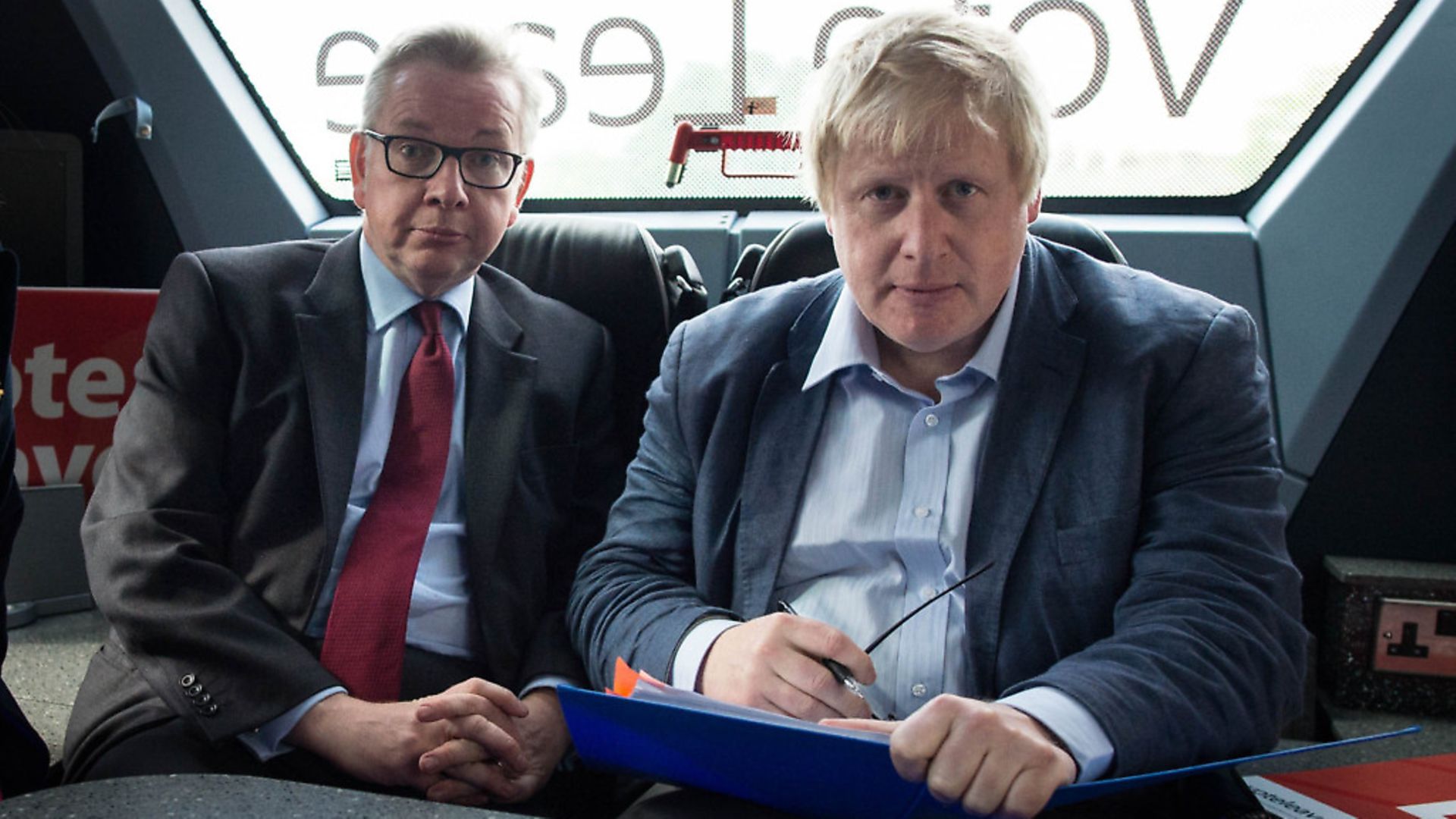
Russia trolls, American bots; uber-rich non-doms, ultra-poor left-behinds. Who knows exactly who drove the UK to vote to leave the EU? And now we have reached the cliff, are we any the wiser about who is at the wheel? Will they take us over the edge or find a magical bridge that leads to nirvana? Is there a reverse gear?
Even the most ardent Leaver would struggle to argue that Theresa May or David Davis is driving this bus. The emergence of the ‘next steps’ letter from Michael Gove and Boris Johnson suggested that Dastardly and Mutley had kissed and made up over a bottle or three of Merlot and were now calling the shots – holding May to ransom, as the Remainer Mail on Sunday put it. Or united in saving Brexit from saboteur Hammond, as its daily sister would have it.
Some of BoGo’s friendly advice to the Prime Minister bore an uncanny resemblance to the strategy outlined by the Legatum Institute think-tank in a paper entitled The Brexit Inflection Point: the Pathway to Prosperity, which promotes a rock-hard Brexit. The ministers’ letter was written last month, shortly before that paper was published and as Legatum luminaries were doing the pre-publicity rounds of the op-ed pages.
Gove and Johnson call for a strict timescale and action to ‘counter those who wish to frustrate’ the ambition of becoming a ‘fully self-governing country’, while Legatum emphasises that time is of the essence, saying that the ‘window of opportunity’ is closing for Britain to make the ‘right decisions’.
Was this why May decided to enshrine the precise minute of Britain’s exit in the withdrawal Bill (and was her resolved stiffened by Paul Dacre’s banquet a couple of nights before her announcement)?
There are plenty of Hard Brexit, no-deal advocates around. The cheerleaders in the press are there for all to see – note the renewal of hostilities against recalcitrant MPs, aka ‘Brexit mutineers’ and Tory ‘collaborators’ – but the people with real influence are operating behind the scenes. Like the Legatum Institute.
Shanker Singham, co-author of the Path to Prosperity report, was the solitary think-tanker when ministers and business leaders gathered at the government’s Chevening country seat last summer; and Freedom of Information requests have revealed that he has had at least seven meetings with David Davis or his DExEU officials since September last year.
Davis and Legatum go back a long way: the organisation financed his trip to a Los Angeles conference in 2009 and he declared a £5,000 fee for a speech at its Mayfair headquarters the following year.
Both Gove and Johnson have also been involved in Legatum enterprises: Gove gave the keynote speech at its summer party last year, which coincided with the launch of a joint research project with the Centre for Social Justice, another right-wing think-tank.
Entitled 48:52, it was supposed to find out why people voted as they did, and provide ‘a roadmap to unite the country’ and ‘heal the divisions’ caused by the referendum. The choice of 48 as the first number in the title did not reflect any particular concern for the frustrations of Remainers.
A year earlier Johnson had launched Legatum’s ‘Prosperity for all’ project through which Conservative Home founder Tim Montgomerie aimed to ‘reclaim capitalism as a moral force’.
Montgomerie, a former Times oped chief and columnist, is a fellow at the Legatum Institute. Neither Gove nor Johnson mentioned any payment for their appearances in the register for members’ interests.
Media types are clearly welcome: Danny Kruger, a former Cameron speechwriter and chief leader writer at the Telegraph, is a senior fellow, as is Cristina Odone, Telegraph columnist, former editor of the Catholic Herald and deputy editor of the New Statesman.
Yet another fellow, the economist Graeme Leach, has a weekly column in City AM. Early this month he offered readers ‘ten unique opportunities that would rise like a phoenix from the ashes’ after a no-deal Brexit.
They included walking away without paying a divorce bill, deep cuts in corporation tax and a plummeting pound that would help exports. ‘As a free market economist, I’m uncomfortable with industrial strategies,’ he wrote, ‘but exiting the EU would provide far more opportunities to dabble with such interventions and buy off certain sectors.’
He also repeated Legatum’s new mantra: that Britain should become ‘a rule-maker not a rule-taker’. This encapsulation of the argument against remaining in the single currency or customs union evokes Dominic Cummins’s ‘take back control’ Leave slogan – a work of genius, according to former Vote Leave chief executive Matthew Elliott, another senior fellow at Legatum.
In spite of having spearheaded two successful referendum campaigns (he was also on the winning side of the one everyone’s forgotten about – parliamentary voting systems), Elliott ranked only 62nd in this newspaper’s Power 100 list of Brexit influencers a year ago. But he was tipped to rise: ‘One of the most formidable political strategists in the country and an unsung titan of the Brexit cause… likes to go about his business without fuss but his influence is set to grow.’ It certainly is now.
Legatum signed him up in January with a brief to focus on two areas: a UK-US trade deal and the rise of populism abroad, particularly America, Germany, the Netherlands and France.
So these are some of the people working with Legatum, but what exactly is LI, where did it come from, what is its purpose?
The Legatum Institute is supposed to provide ‘thought leadership’ for the Legatum Foundation, which is in turn the development arm of the Legatum Group private investment partnership.
The group’s website claims to have a 30-year heritage of long-term value creation and to have a mission to help people live more prosperous lives through social investments that have ‘impacted’ 270 million people since 1999. It then states that it was founded in 2006.
The group, based at Legatum Plaza in Dubai, was established by Christopher Chandler, a New Zealander who made a multibillion-dollar fortune through his previous businesses Sovereign Global and Sovereign Asset Management.
All three concerns specialised in what has been called ‘disaster capitalism’ – essentially spotting the main chance in times of economic turbulence. Legatum has poured money into countries in crisis, notably Brazil and – as Liam Byrne points out on these pages – Russia, boasting that it ‘finds value where disruptive transitions create unique opportunities’.
The key word running through all branches of the organisation is ‘prosperity’ and the stated ambition of increasing it. LI calls its ‘simple big idea’ the prosperity engine; there is even a dormant offshoot called Prosperity International.
For a decade the Foundation has published a Prosperity Index, which judges nations by a number of benchmarks beyond GDP – including, personal health, access to open markets and even wifi access. Last year’s list (a new one is due next week) was topped by New Zealand, pushing Norway down to second, followed by Finland, Switzerland, Canada and Australia. The Netherlands was sixth, the highest ranking of 14 EU states in the top 25; the UK came 10th ‘having leapt five places, thanks to Brexit’. The US was 17th.
The Foundation’s key task is to make grants to those at the ‘bottom of the prosperity ladder’, and its website says that it has invested $84m in 1,480 projects in 107 countries over the past 18 years.
The Foundation, registered in Bermuda, funds a raft of organisations – many of them tax-exempt charities – including a company registered in the Cayman Islands called the Legatum Institute, which sits on a reported deficit of $50m. This is different from ‘our’ LI – which is registered as the Legatum Institute Foundation and operates independently, as a UK-registered charity, from those offices in Mayfair.
This institute was established in 2008, but has only recently become active: its income in 2013 was reported as £2,500, in 2015 it was £4m.
At that point the pro-EU historian/journalist Anne Applebaum was a leading light, but she quit at the end of last year when the Eurosceptic Baroness Stroud was appointed chief executive.
The institute was ostensibly neutral through the referendum campaign, but its membership has always tended to the Eurosceptic – trustees include the businessman Toby Baxendale, who led Andrea Leadsom’s Tory leadership campaign – and it has now embraced the Brexit cause with vigour.
Stroud previously ran the Centre for Social Justice, which she founded with Tim Montgomerie and Iain Duncan Smith, for whom she was a special policy adviser for five years.
He repaid the compliment by writing the foreword to the institute’s The Road to Brexit report in October last year. Other contributors to that work, the follow-up to the 48:52 study, included the MPs John Redwood, Bernard Jenkin, Owen Paterson and Peter Lilley.
These days the key Legatum player is Singham, the director of economic policy and prosperity studies who is now heading up its special trade commission. The LI website describes him as a leading expert on international trade who has advised the US government and a host of political candidates.
Others are less admiring, pointing out that he may have been an adviser – one of several hundred, according to the Sunday Times – but that he is no negotiator. It has also been noted that his involvement does not necessarily bring success: he advised Mitt Romney on both his failed presidential campaigns, Mario Rubio on his failed attempt to win the Republican presidential nomination, and – he claims – the US government on the failed TTIP deal with the EU.
Meanwhile, the Government has signed up one of Singham’s commissioners, Crawford Falconer, as its chief post-Brexit trade negotiator.
This, then, is the organisation that has, as former EU trade negotiator Miriam Gonzàlez Duràntez put it, ‘mesmerised’ the Government so that it now appears to be steering Britain’s approach to Brexit. An organisation founded on the principle of ‘finding value from disruptive transitions’. An organisation whose leaders want to ‘dabble’ in industrial strategies and ‘buy off certain sectors’. An organisation whose watchword is prosperity.
For the many? Or the few?










